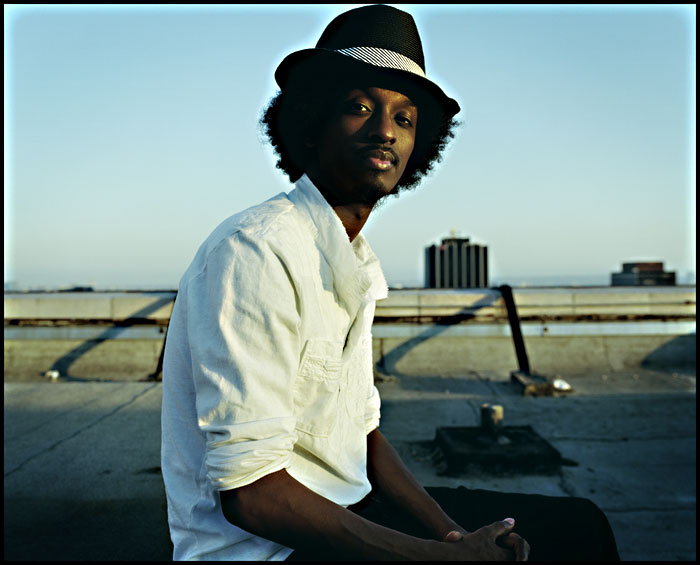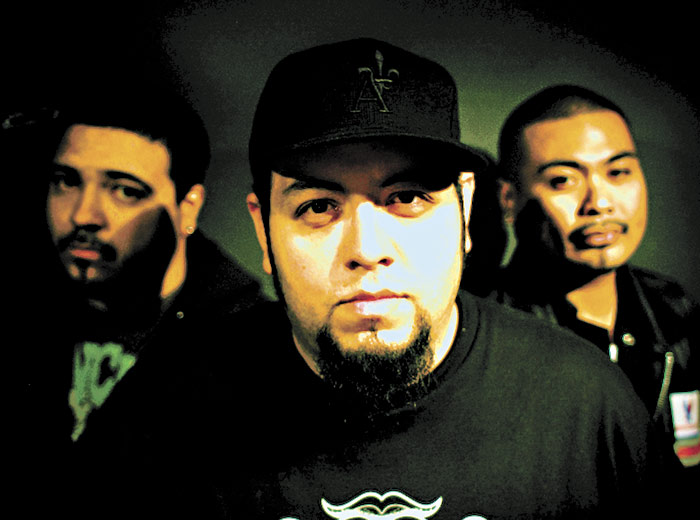Keinan Warsame vividly remembers the first time he was impressed by a rap song. As a recent transplant from war-ravaged Somalia, the then-15-year-old immigrant barely understood English and openly admits that he didn’t respect the language either. But one day, while perusing a record store in Toronto, his adopted hometown, a dark, piano-laced rap song gave the young MC, who now goes by the name K’naan, a reason to rethink that stance.
“The first hip-hop song that ever spoke to me was ‘New York State of Mind’ by Nas,” a soft-spoken K’naan recalls during a recent phone chat. “I took English quite lightly, having come from a language far older and therefore far more able to articulate the emotions of people. I thought you couldn’t really make great lyrics on a language too small and too young. Nas proved that wrong to me.”
K’naan remembers being amazed by Nas’ ability to depict what life was like for inner-city black youth, and the way that gave him hope for a language he was still resistant to learning. “That showed me that if there was a way to paint the young black man’s experience [in America], then I could paint the African slum dweller’s experience as well. Now I still think English is a small language, but I know how to stretch it and push it around and make it submit to my ideas of poetry and music.”
From that moment, K’naan has been a storyteller, something that comes naturally to him. His grandfather, Haji Mohammed, was one of Somalia’s most revered poets, and his aunt Magool was one of its greatest singers. So making music involving urban poetry is practically K’naan’s birthright.
These days, the 30-year-old artist is one of the most buzzed-about figures in hip-hop, based on the strength of his latest album, Troubadour, which hit stores last week. It’s the follow-up to his breakthrough debut, The Dusty Foot Philosopher, which first gave the world a taste of K’naan’s sound, one rooted in East African rhythms with lyrics so vibrant and piercing that it’s as if Bob Marley and Che Guevara were ghostwriters on the project.
Dusty Foot’s lead single, “Soobax,” was highly critical of the Somali warlords destroying his country and challenged them directly. Just as Chuck D once called rap “the CNN of the ghetto,” K’naan’s music brings issues critical to Somalis into the North American consciousness.
K’naan is outspoken about his compassion for Somali pirates, raps both in English and his native tongue, and references his Muslim faith in his music. Yet he’s somehow been able to find acclaim in a United States that openly disdains all of the above.
“The interesting thing about my music—and I didn’t know this until I started to play live—is that it transcends a lot of things. If we play Bonnaroo—and it’s predominantly all white—the vibe is incredibly strong, people love the music and they’re singing along to the words. Then I’ll play Minneapolis, and it’ll be 80 percent Somalis at a sold-out show. And they’ll be singing the words too. The difference is the way people translate my music into their lives is very different. It’s culturally based. Somalis will of course have more resonance to the music because it’s biographical to them. Others will appreciate it because it’s good music and it’s saying something.”
When speaking with K’naan, his patience and hyper-humility stand out immediately. To him, his most important role isn’t being a musician, but a husband and father (he has two children with his wife, Deqa). It’s a stark contrast to the gangster braggadocio that cripples most hip-hop. But as K’naan is quick to point out, he comes from Mogadishu, “the meanest streets in the world,” so most rap antics are just comical to him. In the song “If Rap Gets Jealous,” he even takes a quick jab at 50 Cent, the biggest gangster rapper of this era, who infamously got his chain snatched in the middle of a concert in Angola last year. He’s slyly suggesting some of today’s rappers wouldn’t last 20 minutes in his old hood.
Still, he knows it’s a miracle that he’s alive to make music at all. In 1991, after narrowly escaping the war-torn streets of his neighborhood Wardhiigleey (which translates to “river of blood”), K’naan and his family were aboard the last commercial flight out of Mogadishu before the airport closed and the government collapsed. (His family was approved for an exit visa on the last day the U.S. Embassy remained open before the current civil war began.) In “People Like Me,” from Troubadour, he raps about the pain of his final hours in Somalia: There wasn’t enough money for the plane tickets/How bitter when my mother had to choose who to take with her. So my cousin got left in the war/And that’s just hard to record.
For the first minute of the song “America,” which features Mos Def and Chali 2na, K’naan raps in Somali. He closes the song the same way, and the juxtaposition between ‘hood English and shantytown Cushitic is a strong artistic touch that’s potentially lost on most North American ears.
Reviewers are hurling praise at the album, but an undercurrent of criticism for Troubadour argues that it suffers from commercialism. Guest appearances include Adam Levine of Maroon 5, Damian Marley, Chubb Rock, and Kirk Hammett of Metallica, who plays guitar on a remake of “If Rap Gets Jealous,” a song which debuted on Dusty Foot Philosopher.
“If you’re from North America, you can feel the music and appreciate the music, but you’ll never fully understand this music,” K’naan says. “It’s natural for me to record with Kirk Hammett. It’s natural for me to record with Tony Allen [Fela Kuti’s drummer] and Damon Albarn [of Blur]. I’m not containable in a box. I can’t be branded by the stamp of a genre. I’m not interested in that at all.”
Except for two songs, Troubadour was recorded in Bob Marley’s Tuff Gong studio in Kingston, Jamaica. The whole Marley clan is supportive of K’naan’s music, but the rapper realized he was being offered a rare opportunity when Stephen Marley allowed K’naan to move into Bob’s actual house.
“He said, ‘Nobody gets this key to my dad’s house, and this is for you—stay as long as you want,'” K’naan recalls. “So I set up shop and stayed for three months.”
Now that the album is finished, he’s touring extensively, and is eager to visit Seattle as he’s well aware of the city’s sizable East African population. Because his show next week is at a nightclub where alcohol is served, he knows certain Muslims may choose not to attend for cultural/religious reasons. Asked if he had a message for his supporters who won’t get to see him, he’s cautious in his response.
“Honestly, I never have sweeping messages of wisdom for anyone. But East Africans—Ethiopians, Somalis, Eritreans—they know I’m out there representing something that they have long hoped to be represented, and I do it in a dignified manner. Let’s let the music get out there and let the whole world hear it. And then I’ll hit the corners that nobody else knows about. That’s my dream.”






